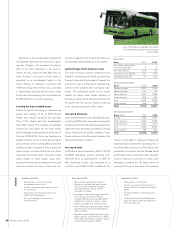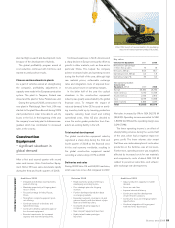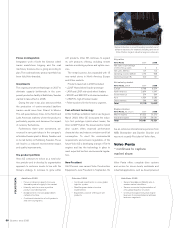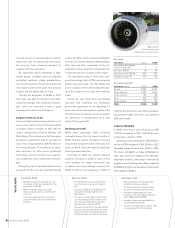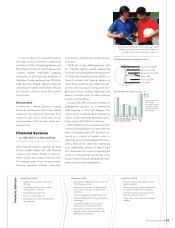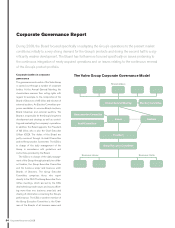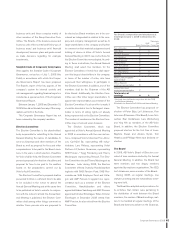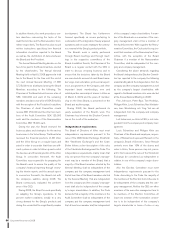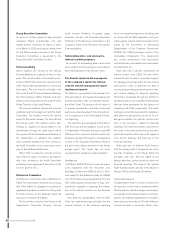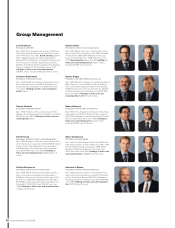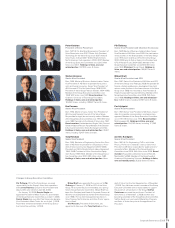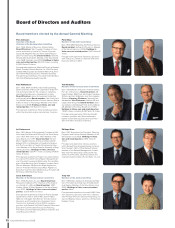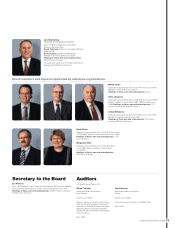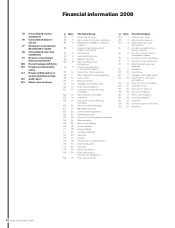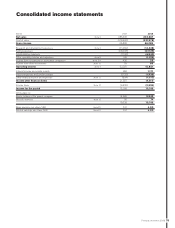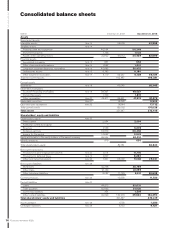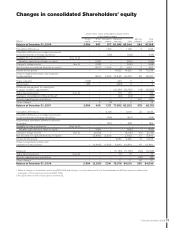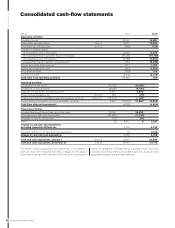Volvo 2008 Annual Report Download - page 72
Download and view the complete annual report
Please find page 72 of the 2008 Volvo annual report below. You can navigate through the pages in the report by either clicking on the pages listed below, or by using the keyword search tool below to find specific information within the annual report.
Group Executive Committee
An account of their respective age, principal
education, Board memberships, own and
related parties’ ownership of shares in Volvo
as of March 4, 2009, and year of joining Volvo
for the CEO and each member of the Group
Executive Committee is presented in the
Group Executive Committee section.
External auditing
Volvo’s auditors are elected by the Annual
General Meeting, for a period of three or four
years. The current auditor is Pricewaterhouse-
Coopers AB (PwC), which was elected at the
2007 Annual General Meeting for a period of
three years. The next election of auditors will
thus be at the 2010 Annual General Meeting.
Two PwC partners, Göran Tidström and Olov
Karlsson, are responsible for the audit of Volvo.
Göran Tidström is the Lead Partner.
The external auditors discuss the external
audit plan and risk management with the Audit
Committee. The Auditors review the interim
report for the period January 1 to June 30 and
the annual report. The auditors report their
fi ndings as regards the annual report to the
shareholders through the audit report, which
they present to the Annual General Meeting of
the shareholders. In addition, the auditors
report detailed fi ndings from their reviews to
the Audit Committee twice a year and, once a
year, to the full Board of Directors.
When PwC is retained to provide services
other than the audit, it is done in accordance
with rules decided by the Audit Committee
pertaining to pre-approval of the nature of the
services and the fees.
Disclosure Committee
A Disclosure Committee was established in
2004. The Committee contributes to ensuring
that Volvo fulfi lls its obligations according to
applicable legislation as well as to listing rules
to timely disclose to the fi nancial market all
share price sensitive information.
The Committee comprises the heads of the
departments Corporate Finance, Internal
Audit, Investor Relations, Corporate Legal,
Business Control and Financial Reporting.
Chairman of the Disclosure Committee is the
company’s Senior Vice President of Corporate
Communications.
Outstanding share- and share-price-
related incentive programs
An account of outstanding share- and share
price-related incentive programs is provided in
Note 34 Employees in the Group’s notes.
The Board’s report on the key aspects
of the company’s system for internal
controls and risk management regard-
ing fi nancial reports
The Board is responsible for the internal con-
trols according to the Swedish Companies Act
and the Swedish Code of Corporate Govern-
ance (the Code). The purpose of this report is
to provide shareholders and other interested
parties an understanding of how internal con-
trol is organized at Volvo with regard to fi nan-
cial reporting.
The report has been prepared in accordance
with the Code and the guidance issued by the
Confederation of Swedish Enterprise and FAR
SRS and is thus limited to internal control over
fi nancial reporting. This report is included as a
section in the Corporate Governance Report,
but does not comprise a portion of the formal
annual report. This report has not been
reviewed by the company’s external auditors.
Introduction
Until March 2008 AB Volvo’s Series B shares
were registered with the Securities and
Exchange Commission (SEC) in the US. Volvo
was subject to the Sarbanes-Oxley Act (SOX)
until the B shares were deregistered from the
SEC. SOX includes, among other things, com-
prehensive regulations regarding the evalua-
tion of the internal control over the fi nancial
reporting.
Also after the deregiotation from the SEC
Volvo has maintained many principles for the
internal controls of the fi nancial reporting
which were implemented when the Group had
to comply with the SOX-regulations. Volvo pri-
marily applies internal control principles intro-
duced by the Committee of Sponsoring
Organizations of the Treadway Commission
(COSO). The COSO principles consist of fi ve
interrelated components. The components
are: control environment, risk assessment,
control activities, information and communica-
tion and follow-up.
Volvo has had a specifi c department for
internal control since 2005. The aim of the
Internal Control function is to provide support
for management groups within business areas
and business units, so that they are able to
continuously provide good and improved inter-
nal controls relating to fi nancial reporting.
Work that is conducted through this function is
based primarily on an evaluation methodology
that has been developed for the purpose of
complying with SOX requirements. The meth-
odology is aimed at ensuring both compliance
with directives and policies, as well as to cre-
ate good conditions for specifi c control activ-
ities in key processes related to fi nancial
reporting. The Audit Committee is informed of
the result of the work performed by the Inter-
nal Control function within Volvo with regard to
risks, control activities and follow-up on the
fi nancial reporting.
Volvo also has an Internal Audit function
with the primary task of independently verify-
ing that companies in the Group follow the
principles and rules that are stated in the
Group’s directives, policies and instructions for
fi nancial reporting. The head of the Internal
Audit function reports directly to the CEO, the
Group’s CFO and the Audit Committee.
Control environment
Fundamental to Volvo’s control environment is
the business culture that is established within
the Group and in which managers and employ-
ees operate. Volvo works actively on communi-
cations and training regarding the company’s
basic values as described in The Volvo Way, an
internal document concerning Volvo’s busi-
Corporate Governance 2008
68


